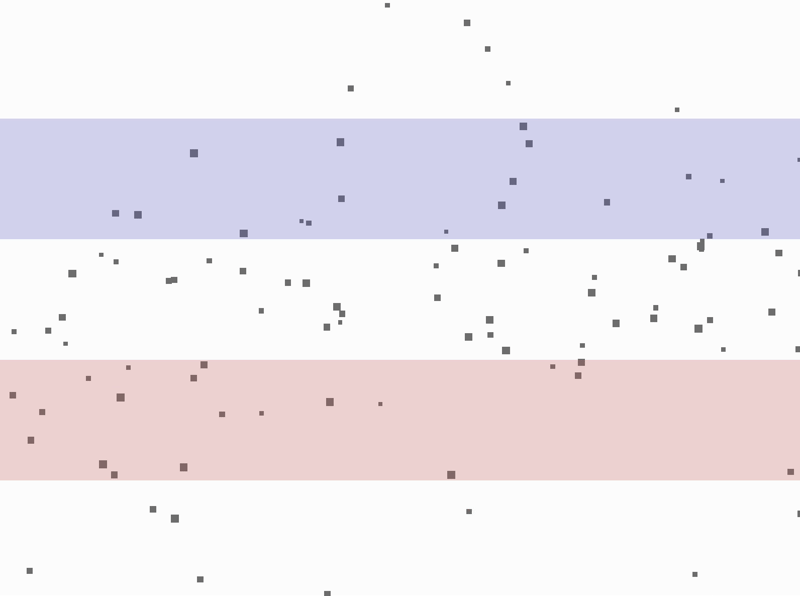🚙
空気抵抗と加速帯のシミュレーション

青い部分に入ると抗力を受けて減速し、赤い部分では加速させられる
公式の簡略化
実際の複雑な公式から「密度」や「面積」などを省くと単に「速度の二乗」×「抗力係数」になる。そこで時速 50 Km で抗力係数を -0.001 とした場合、
50 * 50 * -0.001 # => -2.5
となり時速 2.5 Km の空気抵抗を受けているとわかる。
遅いほど空気抵抗が減る
50 * 50 * -0.001 # => -2.5
40 * 40 * -0.001 # => -1.6
30 * 30 * -0.001 # => -0.9
減速するほど空気抵抗が減っていくのがわかる。
反対方向に移動しない
ここがおもしろいところで、普通は加速度に反対の力を加えていくとそのうち逆方向に進むが、空気抵抗の場合その力は自分自身の速度から生まれているので、逆方向に進むことはない。例えば速度 0 Km まで減速していくと加速度に加える力は 0 になる。
2 * 2 * -0.001 # => -0.004
1 * 1 * -0.001 # => -0.001
0 * 0 * -0.001 # => -0.0
わかりやすく言えば、自転車で停止していると風力を感じなくなるのと同じ。
流体抵抗は抗力が強くなっただけ
仮に空気抵抗の抗力係数を -0.001 から -0.01 に変更してみると、
50 * 50 * -0.01 # => -25.0
時速 50 Km で走っていた車が一瞬で 25 Km 減速した。これはもう海に落ちたとしか思えない。
抗力係数に符号を含める意味
Nature of Code では抗力係数に符号をつけていないが、抗力係数自体に符号を持たせた方が自由度が広がる。例えば、抗力係数の符号をプラスにしただけで、
50 * 50 * 0.001 # => 2.5
50 Km で走っている車はさらに加速していく。なので不思議な力でブーストさせたい場合などに特別なロジックはいらない。抗力係数の符号を反転させるだけでよい。
抗力係数を表す変数
Nature of Code では変数 c が使われているが、これじゃなんのことかわからない。c はおそらく抗力(drag)の係数(coefficient)の c だと思われるが単語にしたところで coefficient になるので何の係数かわからない。したがって drag_coefficient とそのまま書けばいいと思う。
計算式まとめ
物体の属性
location = V.zero
velocity = V[0.0, 50.0]
acceleration = V.zero
物体への空気抵抗
drag_coefficient = -0.001
speed = velocity.magnitude # => 50.0
drag_magnitude = speed * speed * drag_coefficient # => -2.5
force = velocity.normalize_or_zero * drag_magnitude # => (-0.0, -2.5)
物体の加速度に加算して動かす
acceleration += force # => (0.0, -2.5)
velocity += acceleration # => (0.0, 47.5)
location += velocity # => (0.0, 47.5)
acceleration *= 0 # => (0.0, -0.0)
最小限のコード
class App < Base
def initialize
super
a = window_wh * V.zero
b = window_wh * V.one
@location = a
@velocity = (b - a).normalize * 40.0
end
def draw
super
drag_coefficient = -0.01
drag_magnitude = @velocity.length**2 * drag_coefficient
force = @velocity.normalize_or_zero * drag_magnitude
@velocity += force
@location.replace(@location + @velocity)
vputs "force: #{force.round(8)}"
vputs "velocity: #{@velocity.round(8)}"
circle_draw(@location, 30)
end
show
end
実験用のコード
class LiquidArea
attr_accessor :location
def initialize
@location = $app.window_wh * V[0.5, 0.3]
@rect = $app.window_wh * V[1.0, 0.2]
@drag_coefficient = -0.02
@color = :blue_light
end
def update
$app.balls.each do |ball|
if contain?(ball)
speed = ball.velocity.magnitude
drag_magnitude = speed**2 * @drag_coefficient
force = ball.velocity.normalize_or_zero * drag_magnitude
ball.acceleration_add(force)
end
end
end
def contain?(target)
s = @location
t = target.location
(s.x - @rect.x / 2) <= t.x && t.x <= (s.x + @rect.x / 2) && (s.y - @rect.y / 2) <= t.y && t.y <= (s.y + @rect.y / 2)
end
def draw
$app.rect_draw(@location, @rect, color: @color)
end
end
class AccelerationArea < LiquidArea
def initialize
super
@location = $app.window_wh * V[0.5, 0.7]
@drag_coefficient = 0.02
@color = :red_light
end
end
class Ball
attr_accessor :location
attr_accessor :velocity
def initialize
@location = V.rand * $app.window_wh
@velocity = V[rand(-0.5..0.5), rand(0.0..1.0)]
@acceleration = V.zero
@mass = rand(1.0..2.0)
@gravity = V[0.0, 0.005]
end
def update
acceleration_add(@gravity * @mass)
@velocity += @acceleration
@velocity = @velocity.clamp_length(1.0, 20.0) if false
@location.replace(@location + @velocity)
@location.replace(@location.modulo($app.window_wh))
@acceleration = V.zero
end
def draw
$app.point_draw(@location, radius: @mass * 2, color: :grey)
end
def acceleration_add(force)
@acceleration += force / @mass
end
end
class App < Base
attr_accessor :balls
def initialize
super
reset
end
def reset
@objects = []
@balls = 100.times.collect { Ball.new }
@objects.concat(@balls)
@objects << LiquidArea.new
@objects << AccelerationArea.new
@points = @objects.collect(&:location)
end
def button_down(id)
super
case id
when Gosu::KB_R
reset
end
end
def draw
super
@objects.each(&:draw)
@objects.each(&:update)
end
show
end
Discussion